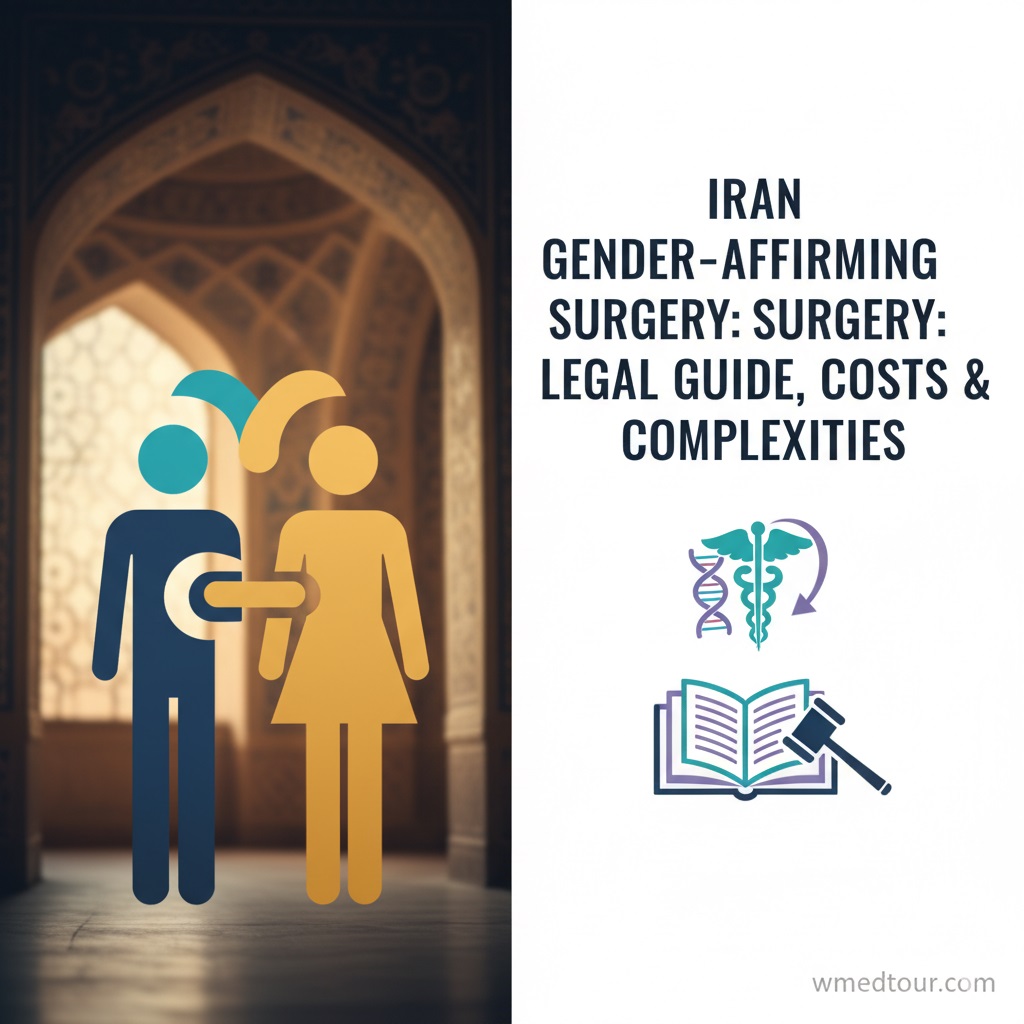Iran Gender-Affirming Surgery: A Comprehensive Guide to Legal, Medical, and Social Complexities
Executive Summary
The availability of Iran Gender-Affirming Surgery (GAS) presents a unique and complex scenario globally. Crucially, Iran has legally recognized the right of transgender people to undergo gender-affirming procedures since the late 1980s, following a fatwa issued by Ayatollah Khomeini. Therefore, Iran stands out as one of the few Muslim-majority countries where these surgeries are explicitly legal. However, this legal recognition primarily focuses on the physical transition, often mandated by legal and psychiatric bodies, rather than a broad acceptance of diverse gender identities. Consequently, patients considering Iran Gender-Affirming Surgery are attracted by the low cost and high technical skill of surgeons, yet they must navigate stringent psychological evaluations and a challenging social environment that often conflates identity with sexual orientation. Ultimately, prospective patients must understand the significant legal mandates and social realities before pursuing treatment.
The Paradox: Legal Surgery in a Complex Social Climate
Iran’s position on gender-affirming procedures is often viewed as a global paradox. Specifically, while same-sex relations are criminalized, the state provides legal and financial frameworks for gender-affirming surgery. This unique stance dates back to 1986, when Ayatollah Ruhollah Khomeini issued a religious decree, or fatwa, legally permitting the surgeries. Consequently, this religious and legal framework made Iran Gender-Affirming Surgery technically permissible and, in some cases, partially subsidized. Furthermore, the legal process requires a legal gender change certificate issued by a court, which is only granted after extensive psychological and medical evaluations.
The Historic Fatwa and Its Impact
The pivotal fatwa reclassified the desire to transition not as a moral or religious failing, but rather as a medical condition requiring treatment. Therefore, it created a pathway for individuals experiencing gender dysphoria to legally alter their documents and undergo surgical procedures. This legal recognition contrasts sharply with the social environment, where in contrast, the distinction between gender identity and sexual orientation is often blurred or ignored by the general public.
In addition, the legal mandate often pushes individuals toward immediate surgical intervention rather than alternative forms of gender affirmation, such as hormone therapy and social transition, which may be prioritized in Western healthcare models. Understanding this legal and regulatory environment is essential for anyone researching Iran Gender-Affirming Surgery.
A Deep Dive into the Required Process
The patient journey for gender-affirming surgery in Iran is highly regulated. Initially, any person seeking these procedures must undergo rigorous psychological screening, often involving multiple specialists over an extended period. This is mandatory for obtaining the necessary legal permission.
The Dual Evaluation and Court Order
The process generally requires two distinct evaluations: one by a forensic medical organization and another by a psychiatric panel. Following this, a court order is required to authorize the gender change on legal documents and permit the surgical procedures. Consequently, obtaining this court order is often the longest and most challenging step, requiring consistent documentation and proof of gender dysphoria. Moreover, some sources suggest that a period of “real-life experience” (RLE) is also required, which means living as the affirmed gender prior to legal and surgical approvals.
Therefore, anyone looking at Iranian medical travel regulations must be prepared for this bureaucratic and invasive process. The rigorous screening is viewed by the state as essential to prevent misdiagnosis.
Pros and Cons of Pursuing Iran Gender-Affirming Surgery
Patients often choose Iran Gender-Affirming Surgery for two main reasons: cost and surgical expertise, but this must be balanced against the significant non-medical challenges.
Pros: Affordability and Expertise
- Cost-Effectiveness: The cost of both trans man (top and bottom) and trans woman (vaginoplasty, breast augmentation) procedures is significantly lower than in many Western nations, often representing a fraction of the price. Thus, it makes GAS accessible to many transgender people who cannot afford it elsewhere.
- Surgical Skill: Iran has a long history of cosmetic and reconstructive surgeries, including rhinoplasty, and this expertise extends to gender-affirming procedures. Consequently, Iranian surgeons are often highly experienced in these specific operations.
- Legal Status: It is one of the few destinations where the surgery is legally recognized by the government, minimizing legal risk for the procedure itself. This is particularly important because it offers a clear, albeit complicated, pathway.
Cons: Societal and Psychological Challenges
- Societal Stigma: Despite legal recognition, trans people often face severe societal stigma, prejudice, and family pressure. Therefore, patients must be prepared for a difficult social environment post-surgery.
- Mandatory Procedures: The legal framework often mandates surgery as the only acceptable outcome for gender dysphoria, leaving little room for non-binary identities or non-surgical paths.
- Invasive Screening: The psychological and forensic screening process is invasive and lengthy, potentially causing distress. In fact, many human rights groups have expressed concerns about the intensity and mandate of these evaluations.
- Lack of Comprehensive Care: While surgical teams are skilled, post-operative psychological and social support infrastructure may not be as robust or culturally sensitive as in other countries. You should compare this with a global medical tourism guide.
Comparison of Procedures and Destinations
When comparing the options for Iran Gender-Affirming Surgery against other popular destinations, cost is the biggest differentiator. In contrast, accessibility and social acceptance weigh heavily in favor of destinations like Thailand or Spain.
| Factor | Iran | Thailand | Europe/US |
|---|---|---|---|
| Legal Status | Legal and state-mandated (requires court order). | Legal and relatively straightforward. | Varies significantly by country/state. |
| Total Estimated Cost | Low (Often 60-80% lower than US/EU). | Moderate. | High. |
| Societal Acceptance | Low, high stigma post-surgery. | High, well-established “medical tourism” culture. | Varies, generally moderate to high in major cities. |
| Psychological Screening | Mandatory, rigorous, and often invasive. | Required, but less centralized. | Required, following WPATH standards. |
Case Study: Understanding the Patient Journey
“Ahmad’s” Journey to Become a Trans Man
Ahmad, a young adult living outside Iran, researched options for top surgery and hysterectomy. He found that the total cost for these procedures was prohibitive in Europe. Consequently, he looked into Iran Gender-Affirming Surgery. First, he traveled to Iran and began the psychiatric evaluation process, which lasted six months and involved multiple sessions with state-appointed doctors. Moreover, he had to secure a court order proving his gender dysphoria. Finally, after his documents were legally updated, he proceeded with the surgeries. As a result, the surgical results were technically excellent and affordable. However, Ahmad reported significant distress due to the lack of social support and the constant need to explain his medical history to strangers and bureaucratic agents, emphasizing that the emotional burden of the process was greater than the physical recovery. This underscores the need for thorough pre-travel checklists.
Who is This For?
Iran Gender-Affirming Surgery is primarily suitable for two groups of people:
- Cost-Sensitive Individuals: Those who require genital or breast surgery and simply cannot afford the high prices in North America, Western Europe, or Australia, and are willing to navigate the complex legal and social landscape for significant financial savings. They must be comfortable with the mandatory, extensive state oversight.
- Individuals Seeking Specific Expertise: Patients seeking highly specialized surgical techniques offered by specific Iranian surgeons, particularly in procedures related to facial feminization or breast surgeries, in conjunction with GAS.
Conversely, this destination is generally not suitable for those who prioritize immediate social acceptance, non-binary affirmation, or seamless psychological support during their transition journey.
Frequently Asked Questions (FAQ) About Gender-Affirming Surgery
We have compiled answers to the most-asked questions regarding Iran Gender-Affirming Surgery. Therefore, these answers should provide clarity for anyone considering this path.
Q1: Is gender-affirming surgery officially legal in Iran?
A: Yes. Gender-affirming surgery has been legally permitted in Iran since 1986, based on a fatwa issued by Ayatollah Khomeini. This legal status is conditional upon obtaining a court order and passing mandatory psychological and forensic evaluations.
Q2: What is the required first step for a trans woman or trans man seeking surgery?
A: The very first step is obtaining a judicial permit, which requires extensive psychological and psychiatric evaluation to confirm the diagnosis of gender dysphoria. This is non-negotiable for legal surgery in Iran.
Q3: Are non-binary identities recognized by the legal system?
A: No. The legal framework is binary, recognizing only the transition from birth-assigned sex to another gender identity. Non-binary or gender-nonconforming identities are not legally affirmed for transition purposes.
Q4: Is the procedure subsidized by the Iranian government?
A: Sometimes. The government may provide some financial assistance for citizens, but this varies, and international patients typically pay the full, lower cost directly.
Q5: What documentation is required for international patients?
A: International patients must have valid passports, medical records supporting gender dysphoria from their home country (though not always sufficient), and be prepared to complete the required Iranian psychological and legal assessments. Consider consulting a global legal guide.
Q6: How long does the pre-surgical evaluation process usually take?
A: The required psychological and legal evaluation can take several months, sometimes up to a year, depending on the individual’s case and the court’s schedule. It is a lengthy process.
Q7: Are there specialized doctors for trans man chest surgery or trans woman vaginoplasty?
A: Yes. Due to the history of legal GAS, specific surgeons have developed expertise in procedures like phalloplasty, metoidioplasty, and vaginoplasty. You can check a general doctor directory for specializations.
Q8: Can a person receive hormone therapy (HRT) without surgery?
A: The legal system strongly favors completing the full transition, including surgery. Therefore, while HRT may be started earlier, it is often viewed as preparatory to the mandatory surgical step required for full legal gender recognition.
Q9: What happens after the surgery regarding legal documents?
A: Once the surgery is completed and confirmed, the court issues a new ruling, allowing the individual to update their birth certificate, national ID, and passport gender marker and name. This is an important step that shows the legal recognition of Iran Gender-Affirming Surgery.
Q10: What is the typical recovery period?
A: The initial recovery for major surgeries like vaginoplasty or phalloplasty is typically 3-4 weeks locally, with full recovery and healing taking up to 12 months. This is comparable to other complex surgeries.
Q11: Are there specific cultural sensitivities to be aware of during recovery?
A: Absolutely. Trans people must adhere to strict public dress codes and gender segregation rules during their stay, which can add complexity to the recovery phase, especially because they will be presenting as their affirmed gender.
Q12: Can I get my pre-operative psychiatric evaluations accepted from my home country?
A: While documentation from your home country is helpful, the Iranian legal process mandates that you undergo evaluation by local, state-appointed psychological and forensic professionals to obtain the required court order.
Essential Resources and Next Steps
Before making any decision, we strongly recommend you consult with authoritative sources on international human rights law and medical ethics to fully understand the context of Iran Gender-Affirming Surgery. Medical tourism requires extensive planning and due diligence.
Further Internal Reading:
- Transgender Surgery Legal Countries Guide 2025
- Rhinoplasty Price in Iran 2025 (Often pursued alongside FFS/TFS)
- Breast Augmentation Cost Iran 2025
- Global Medical Tourism Guide 2025
- Pre-Travel Resources & Checklists for Patients
- Complete Legal Medical Travel Guide: Iran Regulations
- Plastic Surgery Trends: UAE, Turkey, Iran
- Rhinoplasty Iran Cities Guide 2025
- About Our Services
- General FAQs
- Contact Us
- All Available Locations
- Doctor Profiles
- Genital Cosmetic Surgery
- Penile Surgery Options
- Prostate Surgery
- Gynecological Surgical Procedures
- Urological Surgery Department
Disclaimer: This article is for informational purposes only and does not constitute medical or legal advice. Always consult qualified professionals before making medical decisions.




